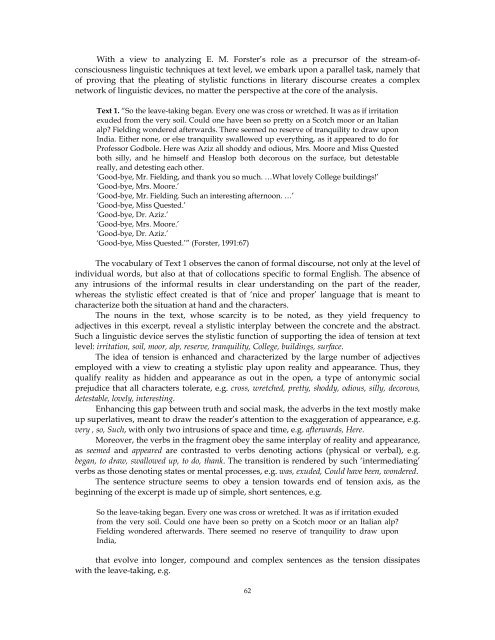Create successful ePaper yourself
Turn your PDF publications into a flip-book with our unique Google optimized e-Paper software.
With a view to analyzing E. M. Forster’s role as a precursor of the stream-ofconsciousness<br />
linguistic techniques at <strong>text</strong> level, we embark upon a parallel task, namely that<br />
of proving that the pleating of stylistic functions in literary discourse creates a complex<br />
network of linguistic <strong>de</strong>vices, no matter the perspective at the core of the analysis.<br />
Text 1. “So the leave-taking began. Every one was cross or wretched. It was as if irritation<br />
exu<strong>de</strong>d from the very soil. Could one have been so pretty on a Scotch moor or an Italian<br />
alp? Fielding won<strong>de</strong>red afterwards. There seemed no reserve of tranquility to draw upon<br />
India. Either none, or else tranquility swallowed up everything, as it appeared to do for<br />
Professor Godbole. Here was Aziz all shoddy and odious, Mrs. Moore and Miss Quested<br />
both silly, and he himself and Heaslop both <strong>de</strong>corous on the surface, but <strong>de</strong>testable<br />
really, and <strong>de</strong>testing each other.<br />
‘Good-bye, Mr. Fielding, and thank you so much. …What lovely College buildings!’<br />
‘Good-bye, Mrs. Moore.’<br />
‘Good-bye, Mr. Fielding. Such an interesting afternoon. …’<br />
‘Good-bye, Miss Quested.’<br />
‘Good-bye, Dr. Aziz.’<br />
‘Good-bye, Mrs. Moore.’<br />
‘Good-bye, Dr. Aziz.’<br />
‘Good-bye, Miss Quested.’” (Forster, 1991:67)<br />
The vocabulary of Text 1 observes the canon of formal discourse, not only at the level of<br />
individual words, but also at that of collocations specific to formal English. The absence of<br />
any intrusions of the informal results in clear un<strong>de</strong>rstanding on the part of the rea<strong>de</strong>r,<br />
whereas the stylistic effect created is that of ‘nice and proper’ language that is meant to<br />
characterize both the situation at hand and the characters.<br />
The nouns in the <strong>text</strong>, whose scarcity is to be noted, as they yield frequency to<br />
adjectives in this excerpt, reveal a stylistic interplay between the concrete and the abstract.<br />
Such a linguistic <strong>de</strong>vice serves the stylistic function of supporting the i<strong>de</strong>a of tension at <strong>text</strong><br />
level: irritation, soil, moor, alp, reserve, tranquility, College, buildings, surface.<br />
The i<strong>de</strong>a of tension is enhanced and characterized by the large number of adjectives<br />
employed with a view to creating a stylistic play upon reality and appearance. Thus, they<br />
qualify reality as hid<strong>de</strong>n and appearance as out in the open, a type of antonymic social<br />
prejudice that all characters tolerate, e.g. cross, wretched, pretty, shoddy, odious, silly, <strong>de</strong>corous,<br />
<strong>de</strong>testable, lovely, interesting.<br />
Enhancing this gap between truth and social mask, the adverbs in the <strong>text</strong> mostly make<br />
up superlatives, meant to draw the rea<strong>de</strong>r’s attention to the exaggeration of appearance, e.g.<br />
very , so, Such, with only two intrusions of space and time, e.g. afterwards, Here.<br />
Moreover, the verbs in the fragment obey the same interplay of reality and appearance,<br />
as seemed and appeared are contrasted to verbs <strong>de</strong>noting actions (physical or verbal), e.g.<br />
began, to draw, swallowed up, to do, thank. The transition is ren<strong>de</strong>red by such ‘intermediating’<br />
verbs as those <strong>de</strong>noting states or mental processes, e.g. was, exu<strong>de</strong>d, Could have been, won<strong>de</strong>red.<br />
The sentence structure seems to obey a tension towards end of tension axis, as the<br />
beginning of the excerpt is ma<strong>de</strong> up of simple, short sentences, e.g.<br />
So the leave-taking began. Every one was cross or wretched. It was as if irritation exu<strong>de</strong>d<br />
from the very soil. Could one have been so pretty on a Scotch moor or an Italian alp?<br />
Fielding won<strong>de</strong>red afterwards. There seemed no reserve of tranquility to draw upon<br />
India,<br />
that evolve into longer, compound and complex sentences as the tension dissipates<br />
with the leave-taking, e.g.<br />
62












